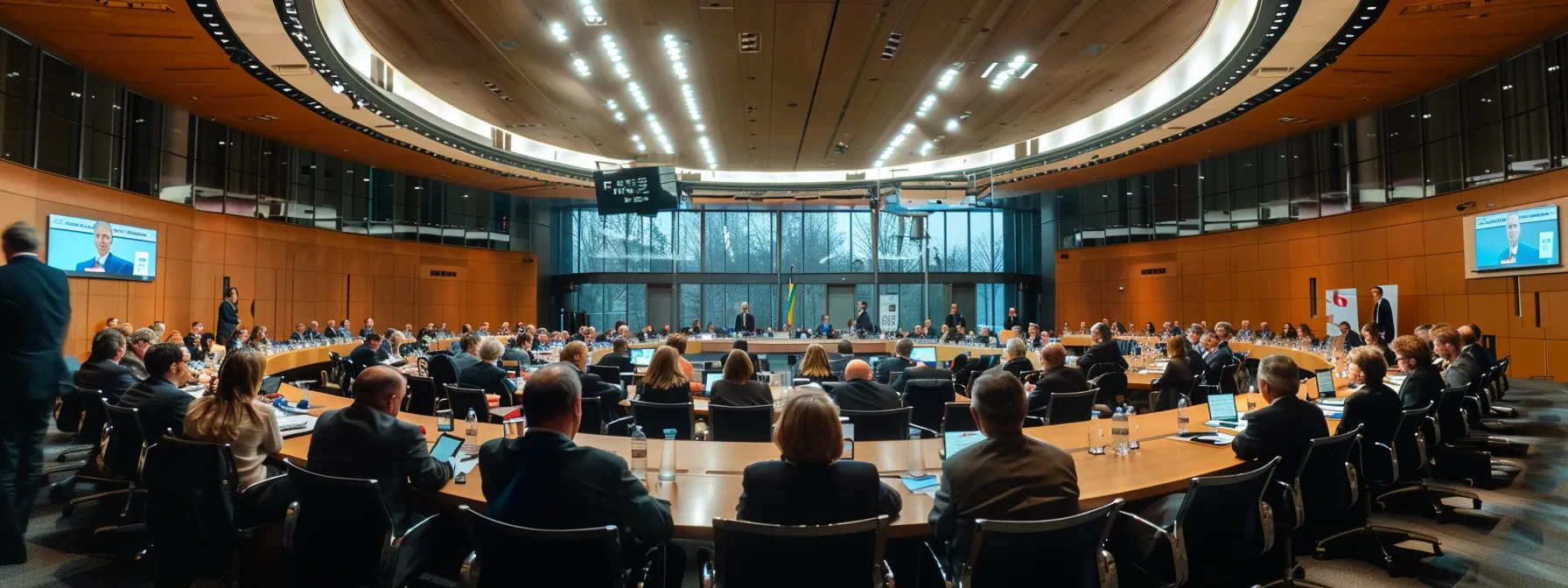Foreign direct investment (FDI) is a cornerstone of global economic growth, yet the legal intricacies surrounding it can perplex even seasoned investors. At the heart of this landscape is the Cooperation and Facilitation Investment Agreement (CFIA), a modern approach designed to streamline investment processes. This post will demystify key aspects of CFIA, contrasting it with traditional investment treaties and examining its role within international investment law. Readers will unlock insights into the practical implications for navigating these agreements within the international landscape, understand the CFIA’s impact on arbitration, and gather knowledge to make informed decisions in a legal framework that directly affects their investments. Addressing the challenge of complexity in investment treaties, this content offers clarity and direction for stakeholders in the world of FDI.
Key Takeaways
- CFIAs focus on investment collaboration and dispute prevention rather than protection alone
- They integrate sustainable development into bilateral investment treaties and global governance
- CFIAs encourage transparency, regulatory stability, and amicable dispute resolution mechanisms
- They adapt to national interests while maintaining compliance with international investment standards
- CFIA trends point towards integrating environmental protection and streamlining dispute resolution
Crucial Insights for a Deeper Understanding

The Cooperation and Facilitation Investment Agreement (CFIA) stands as a modern framework designed to promote and protect foreign investment. It provides a contemporary spin on investment agreements by focusing on collaboration and dispute prevention rather than mere protection mechanisms. Born from a need to enhance the investment landscape, CFIAs aim to facilitate trade, foster investor trust, and support sustainable development. These agreements often emerge where traditional models, such as free trade agreements, may not delve deep enough into the specifics of investment cooperation. As countries move away from fossil-intensive economies, the CFIA plays an integral part in creating a bridge between domestic goals and foreign investment interests, underpinning investment with shared objectives and principles.
The Origin and Evolution of CFIA
The origin of Cooperation and Facilitation Investment Agreements (CFIA) can be traced to the global shift in investment policy evident in recent years. This shift reflects an understanding that the traditional dispute resolution model, often reliant on a tribunal system, does not sufficiently address the wider impacts of foreign investments on domestic policies and development. The European Commission, emphasizing a more harmonious relationship between host states and investors, played a pivotal role in pioneering CFIAs, aligning them with European Union standards and broader goals.
As these agreements evolved, they began incorporating principles from the United Nations Commission on International Trade Law (UNCITRAL), thereby setting a foundation for transparent, equitable, and sustainable investment practices. Unlike their predecessors which focused on investor-state dispute settlements, CFIAs herald a proactive approach by establishing mechanisms for ongoing dialogue and cooperation between signatory parties, allowing for real-time addressing of investment-related concerns and thus fortifying investor trust in policy consistency and fairness.
Objectives and Principles Underpinning CFIA
Central to Cooperation and Facilitation Investment Agreements (CFIA) are clear objectives to reinforce bilateral investment treaties while carving a pathway for sustainable economic relationships. Unlike the North American Free Trade Agreement (NAFTA), which predominantly focused on trade, CFIAs intentionally integrate provisions that support responsible business conduct and economic growth aligned with the host country’s development goals.
As CFIAs take root, they increasingly reflect principles found in the Energy Charter Treaty and the work of entities like the International Centre for Settlement of Investment Disputes (ICSID). By incorporating international investment agreement standards, CFIAs strive to transcend traditional frameworks, fostering investment environments that are predictable, transparent, and supportive of mutual development objectives.
How CFIA Differs From Traditional Investment Agreements
Distinct from traditional investment agreements, Cooperation and Facilitation Investment Agreements (CFIA) shift away from the reliance on international arbitration and arbitral tribunals, which often underscore previous treaties. This evolution reflects lessons learned from contentious disputes involving fossil fuel investments and complex cases in nations diverse as Mexico and the United Kingdom. In essence, CFIAs facilitate a pre-emptive governance model aimed at avoiding disputes rather than primarily resolving them through arbitration.
Instead of focusing on post-conflict resolutions, CFIA champions a mechanism where continuous dialogue between investors and states precludes the need for an arbitral tribunal. These frameworks encourage direct engagement and problem-solving, which is particularly significant for countries rich in fossil fuels seeking to manage their resources sustainably whilst respecting international investment. CFIA’s proactive approach fosters an environment conducive to long-term partnerships, reducing the likelihood of conflicts escalating to international litigation:
- Promotion of ongoing dialogue and engagement to mitigate disputes
- Sustainable management of resources in fossil fuel-rich countries
- Reduction of reliance on international arbitration
The Role of CFIA in International Investment Law

In the tapestry of global investment, Cooperation and Facilitation Investment Agreements (CFIA) have emerged as vital elements bridging the divide between traditional legal frameworks and the evolving demands of sustainable development. They forge connections with existing international law, influencing norms and practices across industries, including petroleum and those impacted by climate change. In nations from China to those with deep democratic roots, CFIAs shape the contours of investment, particularly in light of contemporary environmental challenges, necessitating a closer examination of their role in international investment law.
CFIA’s Place in the Global Investment Landscape
Within the global investment landscape, Cooperation and Facilitation Investment Agreements (CFIA) play a crucial role in shaping the legal contours between nations, exemplified by agreements like the Transatlantic Trade and Investment Partnership. In Germany, CFIAs influence how domestic courts consider foreign direct investment, maintaining a balance between investor interests and national development objectives. This attentive alignment with legal standards and development policies offers a clear framework to guide investment while preserving the regulatory autonomy of the states involved.
Further eastward, CFIAs demonstrate their significance in the Netherlands where they underpin collaborations that transcend traditional trade agreements, facilitating the establishment of new plants and commercial ventures. These agreements help to circumvent potential disputes by instituting robust mechanisms for mutual dialogue and preventative diplomacy. Through the lens of CFIAs, investors gain a clear understanding of the expectations and legal protections available, ensuring that the dynamic interplay between foreign investment interests and domestic welfare remains focused on sustainability and shared prosperity.
Integration With Existing International Legal Frameworks
Integration of Cooperation and Facilitation Investment Agreements (CFIA) within existing legal frameworks ensures that foundational principles such as the rule of law and regulation harmoniously align with international investment norms. Entities like the Office of the United States Trade Representative actively seek to infuse CFIAs into broader trade dialogues, planting the seed for a global investment environment shaped by fairness and inclusive growth. Establishing this congruence propels economic partnerships forward, underwritten by shared understanding and respect for sovereign regulation.
By embedding CFIA structures in the international legal tapestry, countries bolster their investment climates with transparent and predictable tax regimes, crucial for attracting and sustaining foreign direct investment. This convergence between CFIAs and established legal systems provides investors with crucial assurances, facilitating investments in a landscape where adherence to the rule of law becomes a beacon for economic stability and business success. Such alignment demonstrates the genuine adaptability of CFIAs, guiding foreign investment in sync with evolving national and international regulations.
Impact on International Investment Norms
The introduction of Cooperation and Facilitation Investment Agreements (CFIA) has significantly impacted the fabric of international investment norms. As multinational corporations seek to align investments with robust food safety protocols and climate-conscious practices, the principles set forth in CFIAs offer a framework for adhering to stringent environmental and public health standards. Notably, within jurisdictions like Switzerland, such agreements play a pivotal role, ensuring that corporate investments complement local sustainable development goals.
In relation to Spain, where the economy is increasingly receptive to international investment, CFIAs have provided an avenue for foreign entities to invest with confidence, understanding their obligations and the expectations of the host country. This harmonization of investment practices under CFIA guidelines is encouraging a new era of international cooperation where trade, legal certainty, and mutual respect for sovereignty meet the challenges of a globalized marketplace sensitive to both societal and environmental imperatives.
Key Features of CFIA: Facilitating Investment

In the realm of international investment, Cooperation and Facilitation Investment Agreements (CFIA) offer distinct mechanisms for investment promotion and protection. As nations, including Italy, recognize the value in upholding established trade practices akin to customary law within investment contracts, CFIA introduces refined risk mitigation strategies. These agreements are pivotal in fostering enhanced cooperation between host states and investors, particularly in sectors such as fuel, where investment stability is paramount.
Mechanisms for Investment Promotion and Protection
The Cooperation and Facilitation Investment Agreement (CFIA) introduces robust mechanisms for investment promotion and protection designed to harmonize the interests of foreign investors and host countries, like those seen in India’s recent economic initiatives. Such frameworks align with guidelines from the United Nations Conference on Trade and Development, providing clarity on the rights of investors and the responsibilities of nations to maintain regulatory environments that are conducive to growth.
In volatile regions, CFIAs work to mitigate the threat of lawsuits arising from investment disputes, exemplified by the challenges faced in Venezuela. Through the CFIA’s facilitation of dialogue and mediation processes, potential conflicts are addressed proactively, thereby protecting the laws of the host country while upholding the legal security businesses require to thrive.
Risk Mitigation Strategies Within CFIA
Within the framework of Cooperation and Facilitation Investment Agreements (CFIA), one key risk mitigation strategy is the establishment of a joint committee or similar bodies that provide a platform for continual dialogue between investor and state. For example, in Latin America, nations have utilized such committees to address issues quickly and present evidence mutually acceptable to both parties, before they escalate into formal disputes that could impact the broader relationship or necessitate involvement of the World Trade Organization (WTO).
Another risk mitigation feature embedded in the CFIA is the emphasis on transparency and regulatory stability, particularly valued by developed countries seeking to protect their interests abroad. These agreements ensure that changes in laws or policies do not blindside investors, stipulating that any alterations be communicated promptly. This approach provides investors with the certainty required to make informed decisions and safeguards the legal frameworks supporting international investments.
Enhancing Cooperation Between States and Investors
In the context of Cooperation and Facilitation Investment Agreements, Peru exemplifies enhancing cooperation between states and investors, particularly in the finance sector. By actively engaging with French investors and incorporating mutual respect for nationality and cultural differences in their business practices, they have forged partnerships that respect sovereign laws while promoting foreign capital inflow. This bilateral respect paves the way for a stable investment climate and sustainable economic growth.
Meanwhile, France has shown a commitment to facilitating animal health and safety standards in its investment agreements, cultivating trust with international partners. Such strategic cooperation with host countries helps to demystify regulatory environments, providing transparency that ultimately supports financial ventures. This collaborative approach not only attracts investors but also reinforces the integrity of the investment agreements by ensuring that norms and practices are in harmony with national interests.
CFIA and Investor-State Dispute Settlement (ISDS)

The Cooperation and Facilitation Investment Agreement (CFIA) ushers in a nuanced approach to dispute resolution, prioritizing a balance between safeguarding investor rights and respecting state sovereignty. In scenarios involving countries such as Colombia and Pakistan, where investor-state disputes may concern health regulations or damages, CFIA’s innovative ISDS procedures offer a reconciliatory path. The Canada Border Services Agency, tasked with overseeing cross-border investments, may find these advancements particularly pertinent, providing both predictability and fairness within legal frameworks for international investment disputes.
CFIA’s Approach to Dispute Resolution
The approach to dispute resolution within Cooperation and Facilitation Investment Agreements (CFIA) is distinctive in its embrace of transparency and pre-emptive conflict management. This strategy enables nations, such as Ecuador, to navigate investor-state disputes with greater clarity and foresight, ensuring that both parties enter negotiations with a clear understanding of their positions. By integrating mechanisms akin to those employed by the International Chamber of Commerce, CFIAs emphasize resolving issues through open dialogue rather than adversarial processes.
In the context of agreements like the Comprehensive Economic and Trade Agreement, CFIA’s dispute resolution framework underscores the preference for mutually beneficial outcomes. It lays down a foundation for both investors and states to address grievances efficiently, drawing from international best practices to forge a consensus-driven resolution pathway. This process not only upholds the legal rights of stakeholders but also promotes enduring trust, crucial for long-term investment relationships.
Balancing Investor Rights and State Sovereignty
The advent of Cooperation and Facilitation Investment Agreements (CFIA) marks a critical point in harmonizing the rights of investors with the sovereign prerogatives of states. In the United Arab Emirates, a country heavily invested in developing its renewable energy sector, CFIAs support a paradigm where property and investment protections dovetail with national interests. This balance is further crystalized at forums like the Permanent Court of Arbitration, where nuanced legal frameworks ensure that the agency of the state in regulating its economy coexists with protecting foreign investments.
Key to the efficacy of CFIAs in maintaining this equilibrium is their construction of a symbiotic legal environment that respects the principles of international investment without undermining state sovereignty. Instances at the Permanent Court of Arbitration illustrate how these agreements set a precedent for negotiation first, where disputes are managed through conciliation, preserving the integrity and autonomy of the involved parties:
- Promotion of renewable energy investments in line with the United Arab Emirates’ strategic goals
- Upholding the right to property while ensuring compliance with national regulations
- Utilizing the Permanent Court of Arbitration as a venue for fair and impartial mediation
- Empowering state agencies to navigate complex legal disputes without forfeiting regulatory authority
Innovations in ISDS Procedures Under CFIA
Cooperation and Facilitation Investment Agreements (CFIA) introduce significant innovations in ISDS procedures, refining the approach towards dispute resolution. In jurisdictions such as Hong Kong and Indonesia, CFIAs have been instrumental in streamlining legislation to prioritize negotiation and conciliation over arbitration. These innovations reinforce the notion that amicable solutions are achievable within a legal framework that facilitates constructive dialogue before escalating to more adversarial forums.
Mauritius and Brazil stand as examples where CFIA frameworks have led to novel ISDS protocols, allowing for direct government-to-investor engagement to preemptively resolve disputes. By incorporating these modernized procedures, CFIA underscores a commitment to maintaining an investment climate where the rule of law is upheld, and disputes are managed with a forward-looking stance, attentive to the nuances of both investors’ and states’ legal concerns.
Comparing CFIA With Traditional Investment Treaties

As nations seek to balance economic expansion with sustainable development, the realm of investment agreements is evolving. The Cooperation and Facilitation Investment Agreement (CFIA) presents distinct legal obligations and a commitment to regulatory compliance that diverges from traditional treaties. Through case studies in countries like the Czech Republic and Chile, the ensuing sections will dissect how CFIA offers advantages like enhanced judgment and sustainability while navigating its unique challenges.
Differences in Legal Obligations and Commitments
Traditional investment treaties stipulate legal obligations that can sometimes impose rigid constraints on a nation’s economic policy, leading to conflicts with sovereignty. For instance, Greece and Egypt, economies that are markedly tourism-driven and culturally unique, may find traditional agreements limiting when seeking to align foreign investment with their development goals. Contrastingly, CFIA offers flexibility and mutual commitment, allowing states like Greece to tailor foreign investment to their heritage-based economy and Egypt to embrace reforms conducive to its economic diversification.
In the case of nations like Turkey and Argentina, both with diverse and dynamic economies, the legal commitments within a CFIA framework emphasize adaptive governance and inclusive economic growth. Whereas Turkey aims to integrate investments that bolster its manufacturing and service sectors, Argentina employs CFIA’s legal framework to ensure that foreign investments support its renewable energy initiatives and agrarian economy without imposing restrictive agreements that could stifle domestic policy innovation.
Advantages and Challenges of CFIA
The Cooperation and Facilitation Investment Agreement (CFIA) offers significant advantages in enhancing global governance and international trade, particularly evident in industries like mining. In the jurisdiction of South Africa, a country with a substantial mining sector, CFIA promotes collaborative understanding, aligns with developmental strategies, and ensures that governance frameworks are conducive to attracting and retaining equitable investment partnerships.
However, navigating the challenges of CFIA requires a careful balance of interests within diverse legal systems. Jurisdictions like South Africa must effectively manage both the promises and the intricacies of CFIAs, which can introduce complexities in policy alignment and adherence to established global governance practices, potentially affecting the consistency of international trade regulations and investment norms.
Case Studies Illustrating CFIA in Practice
One illustrative case study involves Singapore, a hub for international business and a proponent of free trade. While traditional investment treaties have served the city-state well, the adoption of a CFIA has stirred debate among its vibrant company landscape. Singapore’s experience illustrates how CFIAs can align with United Nations goals, aiding in promoting responsible investments and sustainable business practices that extend beyond the scope of traditional free trade agreements.
In another instance, the dialogue on CFIA within a United Nations framework spawned a reassessment of investment agreements worldwide. This reevaluation resonated with the principles of free trade and cooperation. A notable example saw a multinational company leverage the nuanced legal accommodations of a CFIA to overcome bureaucratic hurdles, setting a precedent for future negotiations and showcasing the practical benefits an effectively implemented CFIA offers in complex international investment scenarios.
Legal Frameworks Surrounding CFIA

Within the complex tapestry of international investment agreements, the legal frameworks surrounding Cooperation and Facilitation Investment Agreements (CFIA) provide the structural support essential for successful implementation and enforcement. These frameworks must align with domestic law considerations, interact adeptly with multilateral agreements, and establish robust compliance and enforcement mechanisms. As nations like Kazakhstan and Costa Rica adapt to the nuances of globalization, and entities such as amicus curiae contribute to legal discourse, CFIA’s compatibility with both local and international norms proves indispensable in fostering stable and profitable cross-border investments, including those in Africa.
Domestic Law Considerations for CFIA Implementation
When implementing Cooperation and Facilitation Investment Agreements (CFIA), organizations must consider the compatibility of these agreements with domestic laws to ensure seamless operation and dispute resolution. In Japan, for instance, aligning CFIA protocols with local regulations is crucial to maintaining the nation’s strong export sector while ensuring that foreign investors have clear legal avenues to address concerns.
The United States provides a practical example where domestic law considerations are integrated into CFIA implementation. This careful harmonization supports American enterprises in navigating international investment channels while reinforcing the mechanisms by which dispute resolution can occur without contradiction to U.S. legal principles:
- Ensuring CFIA alignment with U.S. regulations to promote confidence among investors
- Offering clear guidance on dispute resolution processes to safeguard against legal uncertainties
- Facilitating export activities through CFIA provisions that complement U.S. trade laws
Interaction With Multilateral Agreements
Cooperation and Facilitation Investment Agreements (CFIA) carefully intertwine with multilateral agreements, ensuring that principles of national treatment are adhered to within a broader global framework. In countries such as Poland, this approach has successfully harmonized CFIA with the stringent requirements of European Union directives and trade accords, effectively balancing Poland’s commitment to national treatment for foreign investors with its obligations under collective continental frameworks.
The dynamic economies of Laos and Vietnam highlight the complexities of integrating CFIA within the unique ASEAN legal landscape, simultaneously connecting with North American investment principles. By facilitating an investment framework compatible with North American models of national treatment, these Southeast Asian nations are crafting CFIAs that attract diverse international investments while maintaining coherence with ASEAN’s multilateral commitments and regional development goals.
Compliance and Enforcement Mechanisms
The Government of Canada, through entities such as Environment and Climate Change Canada, ensures compliance and enforcement mechanisms in Cooperation and Facilitation Investment Agreements (CFIA) through a rigorous commitment to due process. This adherence upholds standards that prevent discrimination or bias, fostering an investment climate anchored in fairness and transparency.
Ensuring effective enforcement of CFIAs, the Canadian legal framework meticulously integrates provisions that offer both domestic and international investors a level playing field. These mechanisms not only build investor confidence but also exemplify the country’s dedication to equitable and sustainable economic development:
- Robust measures against discriminatory practices to safeguard investor interests.
- Enforcement protocols that yield to international standards, ensuring CFIA efficacy.
- Commitment to due process, ensuring all parties receive objective and unbiased adjudication.
Navigating CFIA: Practical Implications for Investors and States

As Cooperation and Facilitation Investment Agreements (CFIA) evolve, investors and host states must navigate a landscape shaped by economic growth and changing legal frameworks. Strategic engagement with CFIA can bolster resilience against financial crises, promote sustainable climate finance initiatives, and align with Uruguay’s model of leveraging these agreements for development. For host states, adopting CFIA entails adapting to the de facto standards these agreements set in international investment law. Upcoming trends in CFIA herald further integration of environmental, social, and governance factors, reshaping the investment horizon for all stakeholders.
Strategies for Investors Engaging With CFIA
An essential strategy for investors engaging with Cooperation and Facilitation Investment Agreements (CFIA) involves active collaboration with local chambers of commerce, particularly in Latin American countries such as El Salvador and Honduras. These associations provide critical insights into regional market dynamics, including potential allergy to foreign entities, which can inform investment decisions and foster beneficial partnerships.
Moreover, investors aiming to navigate the nuances of CFIAs effectively should consider the systematic evaluation of geo-political landscapes and regulatory climates within Latin American regions. Acknowledgement of such factors is vital for undertaking due diligence, mitigating risks, and maximizing the potential of their investment endeavors in nations like El Salvador and Honduras, where economic frameworks and investor protections continue to evolve.
Guidance for Host States Adopting CFIA
For host states considering the adoption of Cooperation and Facilitation Investment Agreements (CFIA), it is imperative to establish a robust infrastructure that can handle the flow of information effectively. Slovakia, with its burgeoning economy, exemplifies the need for transparent dissemination of information to investors, ensuring their rights and obligations are clearly defined. Constructing such a system, overseen by a dedicated board of directors, imparts a sense of justice and fairness to proceedings, essential for maintaining investor confidence and managing debt obligations with integrity.
Additionally, states must approach CFIAs with an eye toward jurisprudential finesse, leveraging the agreement to bolster legal frameworks while respecting the balance of domestic and international investment norms. Engaging experts to serve on boards and advisory committees ensures that judicial perspectives align with global standards, enhancing legal predictability. Through such engagement, host nations embolden their justice systems to better navigate the complexities of CFIA, steering their economies towards sustainable growth and improving their capacity to manage investment-related debts competently.
Future Trends and Developments in CFIA
Looking ahead, the trend within Cooperation and Facilitation Investment Agreements (CFIA) points toward an intensified integration of environmental protection clauses. This shift acknowledges the mounting global demand for sustainable practices, with nations like Portugal taking the lead in shaping CFIA protocols to include green criteria. Investors and states in locations such as London are increasingly recognizing that honoring these environmental commitments not only safeguards the planet but also solidifies the foundation for resilient and future-proof investments.
Another development sees CFIA embracing more effective settlement processes, catering to the evolving needs of international commerce. Emulating the advanced financial services of London and the burgeoning markets of Thailand, future iterations of CFIA are likely to feature streamlined dispute resolution mechanisms. These innovations aim to quicken the pace of settlement, reduce bureaucratic hurdles, and enhance the overall appeal and execution of cross-border investments, aligning with the fast-moving and interconnected global economy.
Frequently Asked Questions
What exactly is a CFIA in investment contexts?
In the investment world, a “CFIA” refers to a “Certified Financial Investment Analyst,” a professional accredited to evaluate financial assets and advise on investment strategies.
In what ways does CFIA differ from traditional investment treaties?
The Comprehensive and Progressive Agreement for Trans-Pacific Partnership (CPTPP), or CFIA, departs from traditional investment treaties by including progressive labor and environmental provisions, as well as digital trade and intellectual property rights.
Conclusion
Understanding Cooperation and Facilitation Investment Agreements (CFIA) proves vital for navigating the modern investment landscape, as these agreements offer a collaborative approach that balances investor rights with state sovereignty. They diverge from traditional treaties by emphasizing preemptive conflict resolution and sustainable development, ensuring investments align with both global governance and local economic goals. For investors and states alike, engaging with CFIAs can mitigate risks and support fair, transparent, and long-term economic partnerships. In an era marked by globalization and evolving legal norms, a deep comprehension of CFIAs paves the way for more informed and strategic international investment decisions.


